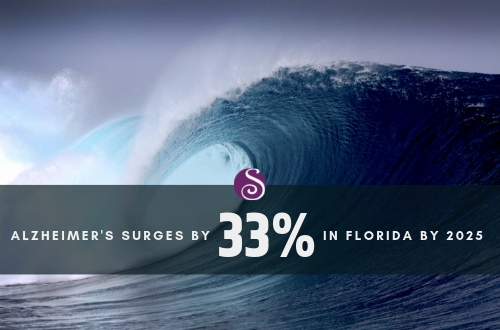The Future of Alzheimer’s in Florida
 Florida is best known for its beautiful beaches, warm climate, theme parks and low cost of living.
Florida is best known for its beautiful beaches, warm climate, theme parks and low cost of living.
Given such an enviable list of advantages, it’s no wonder Florida continues to rank number one for net migration among older adults.
With a full 19 percent of the population over the age of 65, Florida has earned its status as the nation’s top retirement destination. In fact, Florida boasts the highest population percentage of residents age 65 and older in the nation!
Nevertheless, the title does not come without a high price. Florida has far more to worry about than nourishing its 1,350 miles of beautiful coastline and fertilizing its 1,250 golf courses. The future health and wellness of its aging residents are among the state’s chief concerns. More specifically, the spreading impact of Alzheimer’s in Florida.
Despite its year-round sunny disposition, Florida bears the second highest incidence rate of Alzheimer’s disease in the nation, second only to California. And it’s growing at a record pace.
Alzheimer’s Growth in Florida
Of the four million people aged 65+ living in Florida today, it’s estimated that 540,000 are living with Alzheimer’s disease. In the next 10 years, Florida is projected to be home to 720,000 residents with Alzheimer’s disease, and possibly more.
Many studies have attempted to determine the precise prevalence rate of Alzheimer’s, but since many older adults fail to receive a proper diagnosis, nobody knows for certain the true impact of Alzheimer’s disease.
Experts have painted a worrisome picture on the future of Alzheimer’s in Florida:
- Alzheimer’s is the most common cause of dementia
- There is no single test for Alzheimer’s disease
- 7 million Americans live with Alzheimer’s disease
- One in 10 Americans aged 65+ have Alzheimer’s disease
- Alzheimer’s is the sixth leading cause of death in the state of Florida
- 540,000 people aged 65+ are living with Alzheimer’s disease in Florida
- Alzheimer’s will increase in Florida by an estimated 33% between 2018 and 2025
- 11% of Florida’s seniors have been diagnosed with Alzheimer’s disease
- The lifetime cost of care for someone living with dementia is $341,840
- More women than men have Alzheimer’s disease in Florida
- Alzheimer’s disease begins decades prior to symptoms
- By 2050, the costs associated with Alzheimer’s and other dementias will exceed $1 trillion
All of America’s Baby Boomers will be older than age 65 by 2030. This means that in little more than a decade, one in every five people will be retirement age, and many will be affected by Alzheimer’s dementia. And while the plight of Boomer health may not impact other parts of the country with such urgency, for good reason, Florida is prepping early.
The State Of Florida Is Supporting Critical Research
Of the thousands of retirees moving to Florida every year, most will be pleased to learn the state is vested in the health of its future residents to the tune of nearly $27 million dollars to fund its Alzheimer’s Disease Initiative.
That’s not all. The Florida Department of Health awarded $4.8 million in grants for Alzheimer’s disease research at various Florida-based Universities!
In a news release dated Dec. 17, 2018, former Governor Rick Scott said, “Alzheimer’s is a heartbreaking disease and this funding will support research programs across the state in their efforts to find new treatments and preventions that give hope to finding a cure. We are proud to support the many individuals and families who have been affected by Alzheimer’s Disease and look forward to seeing the amazing contributions of Florida’s world-class researchers.”
Dementia-Friendly Florida
Clearly, Florida’s goal to become a “dementia friendly” state is not without just cause. While there remains no cure for Alzheimer’s, continued participation in activities that are meaningful and purposeful is essential to maintaining quality of life among those affected by Alzheimer’s in Florida. Specially designed programs and care interventions that provide focus on a person’s abilities – rather than disabilities – are among the key benefits of living in a specialized memory care community in Florida. Yet many Floridians living with Alzheimer’s will remain in the home for years with a family member who may not have the training necessary to provide proper care.
The Florida State Dept. of Elder Affairs has reacted by expanding the Dementia Care and Cure Initiative. Dementia Caring Communities are popping up all over the state to advocate for the importance of dementia awareness and sensitivity, and to promote better care for Floridians affected by dementia.
Its timing falls on the heels of a new Centers for Medicare and Medicaid (CMS) rule which went into effect in 2018 to allow for reimbursement for the diagnosis, care planning and coordination of patients with Alzheimer’s and other dementias.
Floridians of all ages will have no choice but to become more inclusive of those living with all forms of dementia. Shopkeepers, first responders and children playing in the park will benefit by learning how to recognize the symptoms and how best to interact with people affected by the disease in grocery stores, shops, banks, churches, libraries, parks, restaurants and other public settings.
Changes in state policy and provisions will help mitigate the staggering financial impact Alzheimer’s in Florida will make over the next decade, but elected officials and health professionals alike are left with a nagging question. Will it be enough?
Sources: Centers for Disease Control and Prevention; U.S. Census Bureau; Florida Department of Elder Affairs; Bureau of Economic and Business Research, University of FL; Alzheimer’s Association; 2018 Alzheimer’s Disease Facts and Figures
